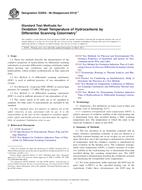We need your consent to use the individual data so that you can see information about your interests, among other things. Click "OK" to give your consent.
ASTM E2009-08(2014)e1
Standard Test Methods for Oxidation Onset Temperature of Hydrocarbons by Differential Scanning Calorimetry (Includes all amendments And changes 2/2/2023).
Automatically translated name:
Standard Test Methods for Oxidation Onset Temperature of Hydrocarbons by Differential Scanning Calorimetry
STANDARD published on 15.3.2014
The information about the standard:
Designation standards: ASTM E2009-08(2014)e1
Note: WITHDRAWN
Publication date standards: 15.3.2014
SKU: NS-43939
The number of pages: 5
Approximate weight : 15 g (0.03 lbs)
Country: American technical standard
Category: Technical standards ASTM
The category - similar standards:
Annotation of standard text ASTM E2009-08(2014)e1 :
Keywords:
differential scanning calorimetry, differential thermal analysis, hydrocarbons, oxidation, oxidation induction time (OIT), oxidation onset temperature (OOT), oxidative stability, pressure differential scanning calorimetry, ICS Number Code 17.200.10 (Heat. Calorimetry)
Additional information
| Significance and Use | ||||||||||||||||
|
5.1 Oxidation onset temperature is a relative measure of the degree of oxidative stability of the material evaluated at a given heating rate and oxidative environment, for example, oxygen; the higher the OOT value the more stable the material. The OOT is described in Fig. 1. The OOT values can be used for comparative purposes and are not an absolute measurement, like the oxidation induction time (OIT) at a constant temperature (see Test Method E1858). The presence or effectiveness of antioxidants may be determined by these test methods. 5.2 Typical uses of these test methods include the oxidative stability of edible oils and fats (oxidative rancidity), lubricants, greases, and polyolefins. |
||||||||||||||||
| 1. Scope | ||||||||||||||||
|
1.1 These test methods describe the determination of the oxidative properties of hydrocarbons by differential scanning calorimetry or pressure differential scanning calorimetry under linear heating rate conditions and are applicable to hydrocarbons, which oxidize exothermically in their analyzed form. 1.2 Test Method A—A differential scanning calorimeter (DSC) is used at ambient pressure, of one atmosphere of oxygen. 1.3 Test Method B—A pressure DSC (PDSC) is used at high pressure, for example, 3.5 MPa (500 psig) oxygen. 1.4 Test Method C—A differential scanning calorimeter (DSC) is used at ambient pressure of one atmosphere of air. 1.5 The values stated in SI units are to be regarded as standard. No other units of measurement are included in this standard. 1.6 This standard does not purport to address all of the safety concerns, if any, associated with its use. It is the responsibility of the user of this standard to establish appropriate safety and health practices and determine the applicability of regulatory limitations prior to use. |
||||||||||||||||
| 2. Referenced Documents | ||||||||||||||||
|
We recommend:
Technical standards updating
Do you want to make sure you use only the valid technical standards?
We can offer you a solution which will provide you a monthly overview concerning the updating of standards which you use.
Would you like to know more? Look at this page.




 Cookies
Cookies
